In a recent interview with Finews, Enna Pariset, CEO and Head of Territory for BNP Paribas Group in Switzerland, shares her insights on our ability to seize market opportunities, our respect for competition and regulation, and how fortunate we are to operate in Switzerland, a country that combines innovation with a strong financial centre.
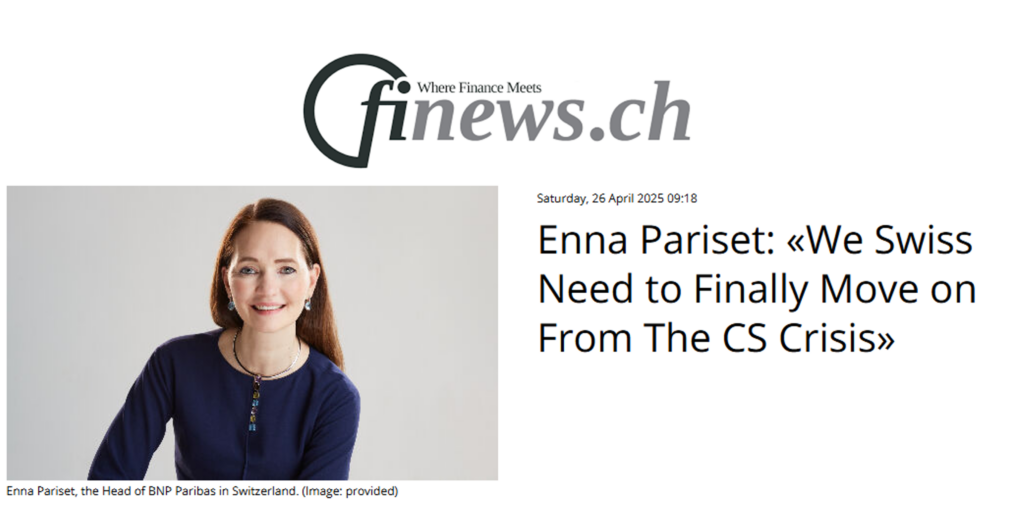
When it comes to preparing for retirement, standard solutions often fall short – particularly for entrepreneurs and wealthy individuals with complex financial situations. Yusuf Savmaz, Head of Switzerland Domestic for BNP Paribas Wealth Management, and Manuel Egger, Wealth Planner for BNP Paribas Wealth Management, shared their insights in Finanz und Wirtschaft, on how integrated, forward-looking planning can make all the difference.
Wealth Architecture with Foresight
Finanz und Wirtschaft
11.04.2025


Image: Wasan Tita/Getty Images
Early, strategic planning for retirement provision is of paramount importance. All assets should be considered as a unified whole.
Yusuf Savmaz, Head Switzerland Domestic, Wealth Management, BNP Paribas Switzerland
Manuel Egger, Wealth Planner, BNP Paribas Wealth Management Switzerland
Retirement provision is like a complex puzzle – especially for wealthy individuals and entrepreneurs. Standard solutions quickly reach their limits. The key difference lies in a comprehensive consideration of all assets. Tools such as BVG 1e pension plans and international aspects are becoming increasingly important.
For individuals earning over CHF 136,080 per year, BVG 1e plans offer an attractive supplement to the traditional pension fund solution. Unlike conventional options, these plans give the insured greater control over their retirement planning. This allows them to seamlessly integrate supplementary pension benefits into their individual wealth planning. For high earners, it is all the more important to focus on retirement provision, as their income tends to drop significantly post-retirement. This makes it essential to cover or reduce living expenses with planned asset drawdowns.
Time as a Key Factor
Time planning plays a crucial role in retirement provision. Those who determine early on which funds need to be available when can act in a more targeted manner and benefit from significant tax advantages.
Clients often have multiple residences in different countries, live under different marital property regimes, or operate internationally active businesses. Their asset situations are complex, for example due to a high proportion of tied assets. In such cases, it is essential to analyze the legal and tax framework – whether for acquiring property abroad or cross-border inheritance planning.
Another important factor: Strategic planning must consider all assets – company structure, private wealth, and pension capital – as a whole. Many bank clients are entrepreneurs whose wealth is spread across various structures. This opens up special structuring opportunities: under certain conditions, company profits can be transferred in a tax-optimized way into retirement provisions such as the 1e solution. Indeed, only a precise, individualized analysis of all assets and retirement goals unlocks the full potential of integrated retirement planning.
Complex Succession Planning
When it comes to the biggest “blind spot,” experts agree: succession planning usually starts too late. For clients, retirement planning is not a routine task – it’s a once-in-a-lifetime responsibility. Entrepreneurs often underestimate the complexity of generational transitions.
For wealth planning experts, this complex transfer process is a key moment and success factor in their advisory work. A long-term strategy – spanning five to ten years – can help to transfer wealth in a structured way. Solutions such as tax-optimized transfers or the establishment of a family office can offer decisive advantages.
Experts agree: Succession planning usually starts too late.”
Age-Appropriate Strategy
Throughout life, the demands on wealth management change. Between the ages of 40 and 60, the focus is on wealth accumulation. From retirement onward, preserving and drawing from capital becomes the priority. A flexible investment strategy enables a smooth transition. A gradual reduction in alternative investments such as hedge funds or venture capital in favor of more stable investments can be beneficial to adapt the portfolio to changing needs.
Wealthy individuals with international exposure often benefit from an integrated wealth structure that considers cross-border financial and tax issues. Tailored solutions are particularly necessary for wealth transfers or financing investments abroad. Access to international financial markets and the use of global expertise are in high demand.
Early, strategic planning is the key to sustainable retirement provision. It enables individuals to achieve their personal goals while making the best possible use of legal and tax frameworks.
In an interview with l’AGEFI, Enna Pariset, our CEO for BNP Paribas in Switzerland, discusses several key topics with Christian Affolter and Frédéric Lelièvre that highlight our development and our commitment to our clients and the Swiss economy. She explains the evolution of our assets under management, the restructuring of our organization around clear priorities, particularly in terms of wealth management, our leading position in the Swiss franc issuance market, and our driving role in IPOs in Switzerland.
BNP Paribas “hopes to support the next Swiss unicorn”
AGEFI
09.04.2025

BNP Paribas “hopes to support the next Swiss unicorn”
Enna Pariset, head of the French group’s operations in Switzerland, intends to fill part of the gap left by Credit Suisse’s disappearance.
After a restructuring marked by the end of commodity trade financing, BNP Paribas (Switzerland) is back on a growth track. In an exclusive interview with L’Agefi, Enna Pariset, who heads all of the French group’s activities in Switzerland, says she is betting on local businesses, start-ups, and wealthy residents. “I truly hope to support the next Swiss unicorn,” she says. The investment banking team is currently preparing two new listings on SIX and intends to “support” companies that UBS cannot or does not want to take over. The growth plan launched in 2021 for this segment is nearing completion, with a cumulative revenue of 1 billion euros and a target of 1.5 billion by 2030. In 2024, assets under management rose from 20 to 25 billion Swiss francs, including 10 billion deposited by Swiss residents. The Geneva-based bank employs about 1,200 people across the country and has resumed hiring. PAGES 2-3
“Our priorities: clients from Switzerland, Italy, Germany and the Middle East”
The Territory Head for Switzerland and CEO of BNP Paribas (Switzerland), Enna Pariset, outlines the group’s activities and explains her growth plan.
By Christian Affolter and Frédéric Lelièvre
The past few years at the Swiss subsidiary of French group BNP Paribas were marked by restructuring, particularly after the shutdown of the historically significant commodity trade financing business. Now, its head in Switzerland, Enna Pariset, aims for a rebound. She oversees all of the group’s activities on this side of the border (see box below) and is leaning on corporate clients seeking alternatives following UBS’s acquisition of Credit Suisse. BNP Paribas’s capital markets activity in Switzerland reflects this strategy. In wealth management too, the institution, which last year moved from Geneva’s banking district to the Lancy Pont-Rouge towers, is once again on a growth path following a portfolio clean-up phase, according to the executive who manages around 1,200 employees.
“Today, out of the 25 billion francs in assets, around 10 billion comes from Swiss clients.”
Enna Pariset, CEO BNP Paribas (Suisse)
▪ At the end of 2023, BNP Paribas (Switzerland) had CHF 20 billion in assets under management, stable compared to 2022. What happened last year?
We ended 2024 with CHF 25 billion. That was expected with the change in our Head of Wealth Management (WM). On August 1, 2022, Beat Bachmann, formerly with UBS and based in Zurich, joined us with a mission to develop the Swiss-resident client base.
A few years ago, I restructured the CIB (Corporate & Institutional Banking) unit in Switzerland to focus entirely on Swiss companies. Now, wealth management must align with this shift. Previously, wealth management benefitted from synergies with commodity trade financing, which we ended and closed by mid-2022. On top of that, the COVID-19 pandemic and the war in Ukraine led us to reduce our risk exposure to Russian clients. We also exited Latin American markets, as our assets there didn’t cover our costs.
We hit a low point at CHF 20 billion in assets. I chose to sacrifice a few billion to redeploy our resources where we could make a difference. We set three priorities: Swiss residents, then German and Italian clients, and finally the Middle East—especially Dubai, which is still accounted for in Switzerland. Today, of the CHF 25 billion in assets, about CHF 10 billion comes from Swiss clients. So I’m pleased.
▪ However, in 2023 and the first half of 2024 (–CHF 17.1 million), you were still in the red and announced a restructuring…
Those figures—more details will be published at the end of April—don’t reflect our actual activity. Losses were mainly tied to restructuring plans in Geneva. We also booked a one-off provision of CHF 16.3 million to cover reorganization costs aimed at improving our operational efficiency in Switzerland. These steps were necessary, especially after halting the commodity financing business.
Of course, I want to reach breakeven, but we can’t do everything at once. In investment banking and asset management, unlike wealth management, very little revenue is booked in Switzerland—it’s accounted for at group level. What really matters are client revenues. Since launching our 2025 growth plan for CIB Switzerland in May 2021, we’ve grown significantly.
We work with Swiss companies with revenues of at least CHF 200 million, as well as Swiss banks—UBS, ZKB, BCGE, BCV, and others—and insurers. We also serve subsidiaries and branches of Swiss and foreign companies, banks, and insurers—in other words, multinational corporations (MNCs). We’ve reached €1 billion in cumulative revenue from Swiss clients—corporates, financial institutions, wealth management—and we aim for €1.5 billion by 2030.
▪ What’s the minimum amount for your wealth management services?
Starting from CHF 5 million, if there is a clearly defined potential. This is mostly the threshold for entrepreneurs who are also CIB clients.
In summer 2021, I created a dedicated team to support tech and healthcare start-ups. We work extensively with start-ups from the ETH and EPFL. It’s a pity that companies born there often end up in the U.S.! As bankers, it’s our role to support them from the outset. We’ve started granting loans of CHF 2 to 3 million to start-ups and support their equity fundraising by attracting a varied, complementary, and stable investor base, with the goal of listing them on SIX. I really hope to support the next Swiss unicorn!
▪ Companies complain about worsening credit access since Credit Suisse’s collapse. Is this an opportunity for you?
I launched the CIB growth plan in 2021, and it will be completed this year. When Credit Suisse’s troubles became apparent in 2023, we had already planned our investments and strategic goals.
“We are working on two IPOs expected in the second half of the year.”
Enna Pariset
The shift came in waves. Multinationals and foreign subsidiaries reacted immediately—they realized they needed to reorganize their cash management. During summer 2023, we were inundated with requests. Swiss companies mostly continued as if nothing had happened—until the merger was finalized in August 2024. It was clear UBS wouldn’t take over everything. With a balance sheet of €2.7 trillion, BNP Paribas can help.
Last year, we added about 20 new Swiss corporate clients and 40 new MNCs, covering everything except real estate, which we rarely touch in CIB. That may change with the acquisition of AXA IM, currently underway and expected to close in summer 2025. AXA IM Switzerland manages about €53.5 billion in assets (as of end-2023) and includes a real estate fund of around CHF 20 billion, bringing us added expertise in that sector.
| January 2004 | Joined BNP Paribas in London |
| April 2018 | Head of Corporate and Commodities Coverage in Switzerland |
| October 2019 | Head of Corporate & Institutional Banking in Switzerland |
| January 2022 | Head of Territory for BNP Paribas in Switzerland |
| July 2023 | CEO of BNP Paribas (Switzerland) |
| April 2018 | Member of the Swiss Bankers Association committee |
▪ You also emphasize your capital markets financing activity. Would that have been possible before the UBS–Credit Suisse merger?
In 2023, we were already the third-largest player in Swiss franc bond issuance (excluding real estate), after UBS and ZKB. Since then, our market share has grown. According to Bloomberg league tables I review every Friday, our share rose from 10.9% in 2023 to 15.3%. For international corporate bond issues, we’ve been just behind UBS for two years. We went from 36 deals in 2023 to 52 last year—and we’ve already reached our 24th this year. Notably, we participated in two of the four IPOs on the Swiss market in 2024: Galderma’s CHF 2.3 billion IPO (as Joint Bookrunner) and the CHF 7.7 billion Sunrise spin-off (as Joint Capital Market Advisor).
▪ Will you be involved in the next IPOs on SIX?
We’re currently working on two IPOs expected in the second half of the year. In my experience, IPO preparation can take up to five years and is often tied to market conditions.
▪ How important would access to the European market be for your business?
It wouldn’t matter much for our investment banking services, as we don’t distribute our products cross-border. We are in Switzerland and we work for Switzerland. In wealth management, BNP Paribas has entities in many other countries. France or Luxembourg are the main distributors in Europe, although we do support our clients while respecting the relevant regulations.
“We don’t see any particular disadvantage, especially since Swiss and European regulations are largely aligned.”
Enna Pariset
▪ Switzerland is the only country already applying the final version of Basel III. Isn’t Bern neglecting the competitiveness of the financial center?
The final version of Basel III is now in force both in Switzerland and in Europe since January 1, 2025. Europe postponed only the market risk component. Competitiveness is a complex issue that depends on each bank’s business model and risk profile.
▪ Are you at a disadvantage compared to banks regulated by the European Central Bank (ECB)?
As a foreign bank, we are supervised by two regulators: the ECB and the Swiss authority FINMA, which takes precedence. So we don’t see any particular disadvantage—especially since Swiss and European regulations are largely aligned. In fact, with instant payments, the reverse is true. They’ve been standard in France for a while. The Swiss National Bank (SNB) asked the 50 largest banks in Switzerland to implement them by last year, and we complied ahead of the August 30, 2024 deadline. Life comes with constraints, and we adapt.
100 New Employees in 2024
As “Territory Head,” in BNP Paribas jargon, Enna Pariset oversees all of the French banking giant’s operations in Switzerland and is one of the top 100 senior leaders in the group.
BNP Paribas (Switzerland) comprises three core units: Wealth Management, Corporate & Institutional Banking (CIB – mid to large Swiss companies, multinationals, financial institutions), and Asset Management.
The group’s presence in Switzerland also includes Arval, the country’s leading car leasing company (24,000 vehicles), and Leasing Solutions, for equipment leasing to businesses.
1,245 Employees in Switzerland
CIB services include Global Banking (treasury and risk management, syndicated loans), Securities Services (custody of securities listed on SIX, for example), and Global Markets (investment and financing solutions). BNP Paribas employs 1,245 people in Switzerland, including 790 in French-speaking Switzerland—760 in Geneva alone—440 in the German-speaking part, and 15 in Lugano. Last year, the workforce grew by about 100 employees. The finalization of the AXA IM acquisition will add 104 employees in Zurich. — CA
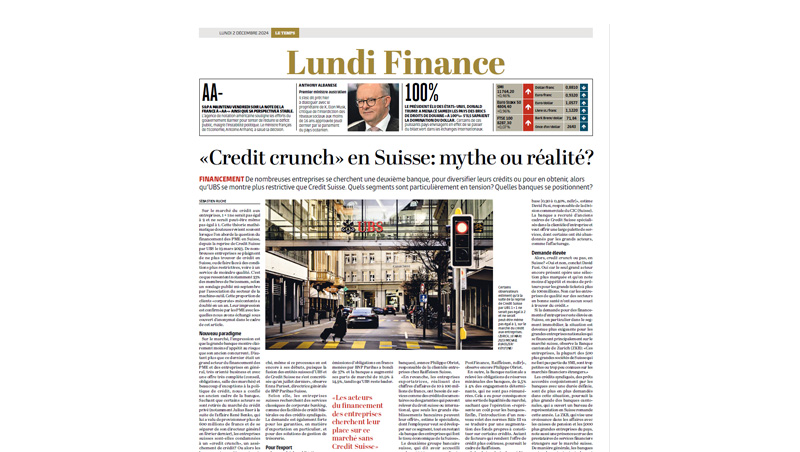
Enna Pariset, CEO and Head of Territory for BNP Paribas Group in Switzerland, highlighted in Le Temps how the UBS-Credit Suisse merger transformed the Swiss credit market for corporates, reshaping dynamics and opening opportunities for BNP Paribas in Switzerland.
As the world around us changes, one thing remains constant: our commitment to fostering a workplace built on inclusivity, respect, and integrity.
On June 12th BNP Paribas in Switzerland received for the second consecutive year the Swiss LGBTI-Label, reflecting our strong commitment to Diversity and Inclusion (D&I) within our corporate culture. The certification ceremony took place at Bayer’s premises in Basel, attended by Thomas Conel, Head of Human Resources and Nicolas Bruyninckx, Lead ambassador of the BNP Paribas Pride Switzerland LGBTI Network.
What is the Swiss LGBTI-Label?
The Swiss LGBTI-Label is a prestigious recognition awarded to organizations in Switzerland that implement and foster a diverse and inclusive work environment.
Obtaining the Swiss LGBTI-Label requires an independent assessment of the company on multiple fronts such as the D&I strategy, the organization around it, communication, and human resources management.

Diversity is not about ticking boxes; it is about creating an environment where every individual, including those in the LGBTQI+ community, feels seen, heard, and valued for who they truly are.
Thomas Conel
Head of Human Resources BNP Paribas (suisse) sa
As both a Swiss and global bank, renewing this label marks a significant milestone. It demonstrates BNP Paribas in Switzerland’s ongoing commitment to providing an inclusive workplace where everyone feels respected, valued, and heard, regardless of their sexual orientation, gender identity, or any other aspect of their identity.
This recognition is also a testament to our corporate values outlined in our Code of Conduct, which celebrates equality, respect, inclusion, and making BNP Paribas a Good Place To Work.
Certification Ceremony, Basel 12.06.2024
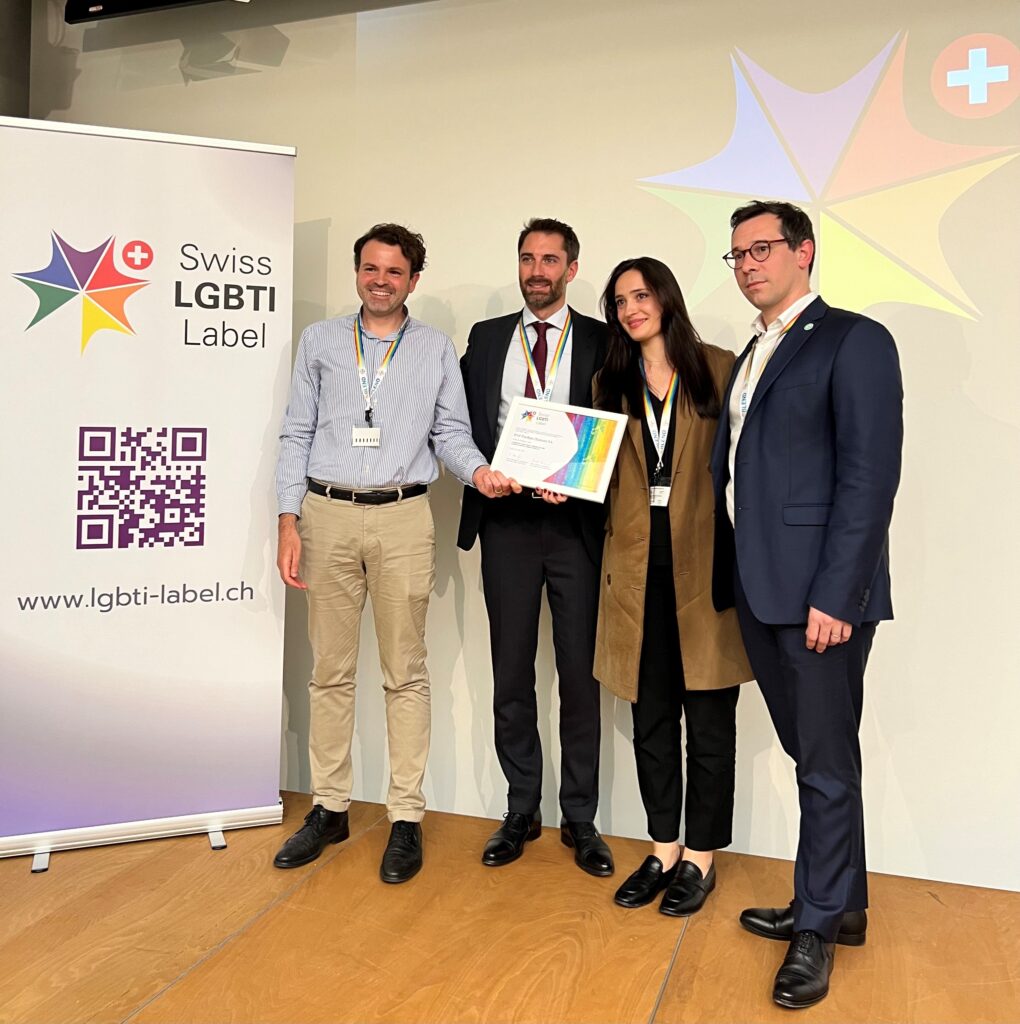
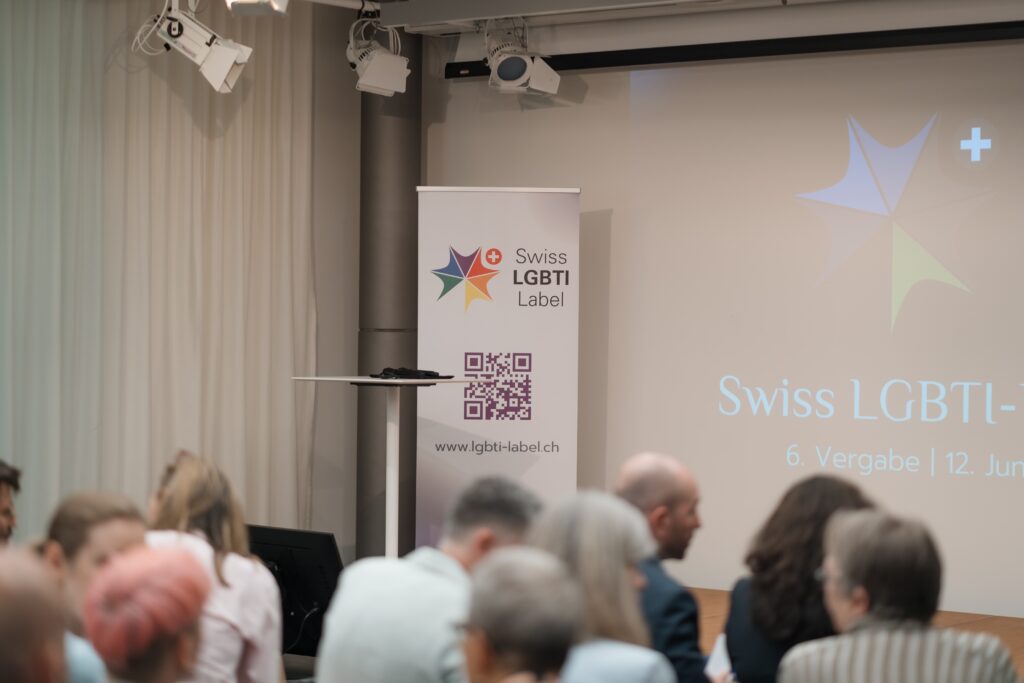

Original article by Holger Alich published in Handelszeitung
This Woman Aims to Challenge UBS
Enna Pariset heads the Swiss subsidiary of the French banking giant, focusing squarely on Swiss clients—including in private banking.
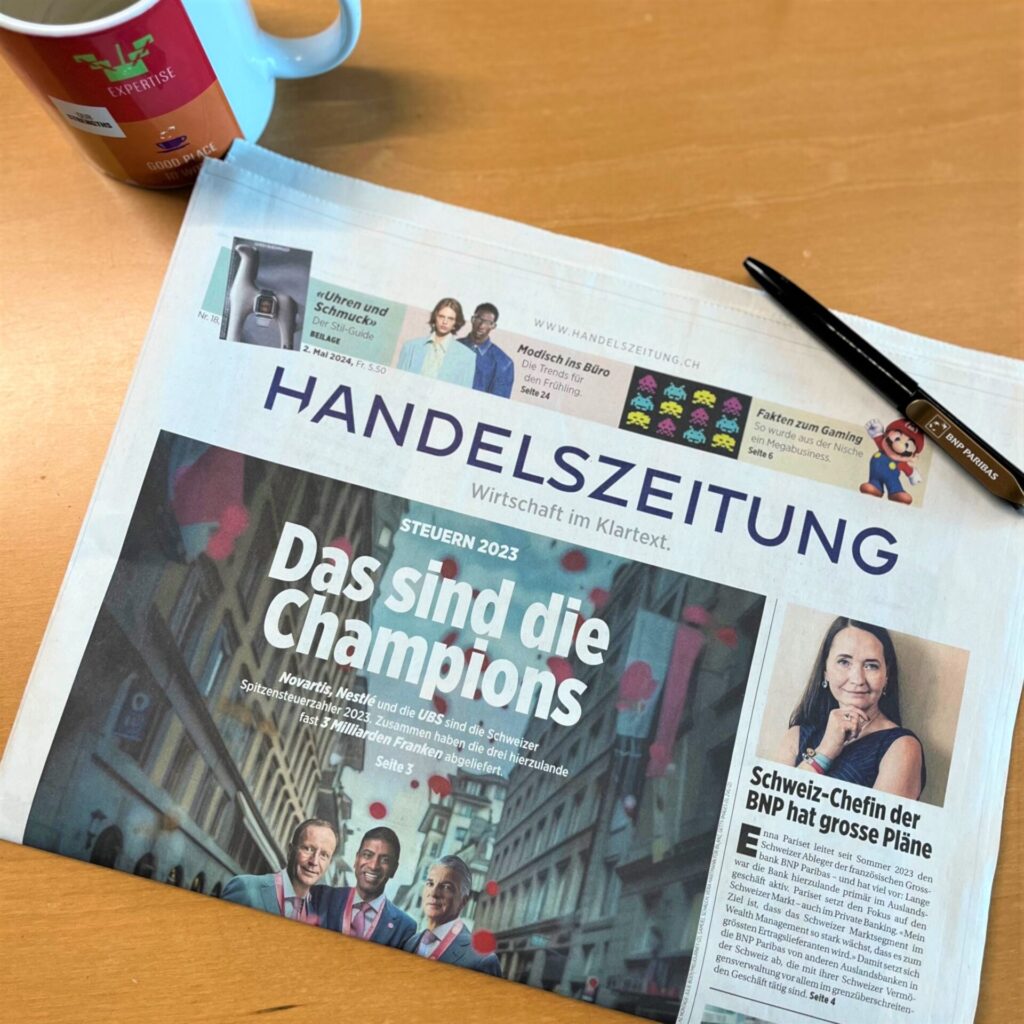
Enna Pariset is an extraordinary woman, notable not only for her role at the helm of a bank—BNP Paribas’ Swiss subsidiary—as one of the few women in such a position, but also for her dynamic personality, which makes even Sergio Ermotti of Ticino seem reserved by comparison.
What’s even more remarkable is her vision for the Swiss branch of the Eurozone’s largest bank. Although BNP Paribas has been active in Switzerland since 1872 and was even involved in financing the Gotthard Tunnel, its presence in the Swiss market has been relatively minimal for many years. Pariset plans to change that fundamentally. “We are not a French bank; we are a Swiss bank that is part of a global group,” she declares.
The Offensive in Swiss Private Banking
Pariset is not only focusing on corporate banking—BNP Paribas’ traditional strength—but also targeting private banking. “My goal is for the Swiss market segment in our wealth management to grow so significantly that it becomes the largest revenue generator,” she states.
Currently, BNP Paribas’ Swiss operation manages 27 billion Swiss francs in client assets, with about 10 billion of that coming from Swiss clients. The rest stems from traditional offshore business with clients from the Middle East, Germany, France, and Italy.
Unlike most foreign players in wealth management who primarily cater to international clients, Pariset sees significant growth opportunities in the Swiss market, particularly in conjunction with the firm’s corporate banking business. BNP Paribas aims to attract top managers and business owners. “I believe the business model of those banks that only offer asset management will come under increasing pressure,” says the BNP Paribas banker.
1300 Employees in Switzerland
To bolster her ambitions in Swiss private banking, Pariset recruited help from UBS, hiring Beat Bachmann, who has been leading Swiss wealth management at BNP Paribas since August 2022. Overall, 260 people work in this division.
While Pariset did not partake in the mass recruitment from Credit Suisse, she does not endorse poaching entire teams, as it risks diluting the firm’s corporate culture. Nevertheless, twelve individuals from Credit Suisse have joined BNP Paribas Switzerland.
Pariset has been leading the Swiss branch of the French bank since July 2023. Across all areas, the bank employs 1300 people in Switzerland. Its parent company is the largest bank in the Eurozone by balance sheet, employing 183,000 people across 63 countries.
Pariset, a seasoned investment banker, spent most of her career with the French financial giant. After earning an MBA from Lehigh University in Pennsylvania, she joined the World Bank in 1994. Three years later, she moved to JP Morgan’s investment banking division. In 2004, she began her stint at BNP Paribas in London, where she was responsible for investment banking in commodities and metals.
In Switzerland, financing commodity trade has long been one of the French bank’s strengths—until 2014, when the U.S. fined BNP Paribas a record $8.9 billion for violating sanctions with countries like Iran and Sudan. The Geneva branch was also reprimanded by FINMA.
Financial Strains
Following these events, the Paris headquarters discontinued its commodity business, a decision still impacting the Swiss branch’s finances: In 2022, the Swiss bank reported a loss of nearly 58 million Swiss francs as it continues to clear legacy issues, which incurs costs. Additionally, in 2019, a cost-cutting program was initiated to centralize certain back-office functions at a group level.
“The balance sheet of our Swiss bank only reflects a portion of our business here,” Pariset explains, noting that their business with Swiss clients is profitable overall, though specific figures were not disclosed.
Besides wealth management, Pariset emphasizes corporate banking, having already shifted focus to Swiss corporate clients before the Credit Suisse crash. The target clients are companies generating over 200 million Swiss francs in annual revenue. Thirty employees manage 1500 Swiss corporate clients.
“A corporate loan is not necessarily the entry product,” notes Pariset. “Some customer relationships, for example, started with us taking over cash management.”
With the restructuring of Credit Suisse, Pariset doesn’t foresee a credit squeeze for corporate clients. However, she expects that the new UBS might scale back some customer engagements to avoid excessive risk concentration, presenting opportunities. In the first quarter, BNP Paribas ranked first in syndicated loans, although these league tables are highly volatile; the bank was sixth in the previous quarter.
BNP Paribas ahead of UBS
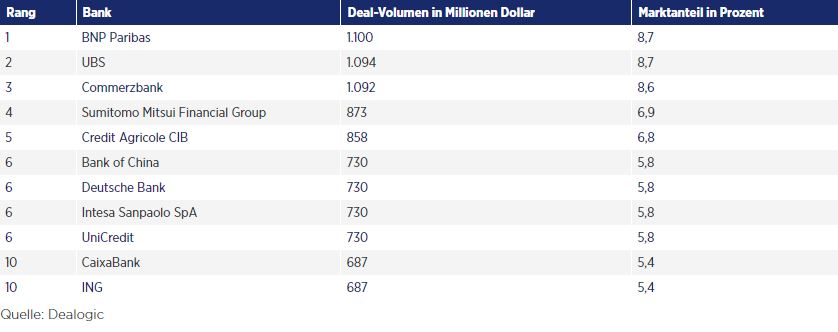
Pariset views the size of the parent bank as a competitive advantage—from mergers and acquisitions to financing foreign trade, currency management, and capital market transactions, BNP Paribas offers a comprehensive range of services. “Among the foreign banks operating in Switzerland, BNP Paribas certainly has one of the greatest potentials here,” comments a CEO of a prominent Swiss industrial company who has dealings with several banks but has not yet done business with BNP Paribas. Thanks to its strong capital base, the bank has ample capacity for loans and can also offer its clients a global payment infrastructure.
Determined to fill the gap left by the dissolution of Credit Suisse, the Paris headquarters has set a target for the Swiss subsidiary to increase revenue by 9% annually between 2021 and 2025. “We have already reached this target in investment banking by the end of 2022, which led to our revenue goal being increased by 100 million,” Pariset reveals. The race to challenge the market leader UBS has truly begun.
- BNP Paribas moved to Via Nassa 11, an iconic address in the centre of Lugano.
- Present for 150 years in Switzerland and for more than 50 years in Lugano, BNP Paribas in Switzerland has thus confirmed its development and investment strategy, serving its clients and the economy in Ticino.
On 12 October 2023, BNP Paribas inaugurated its new premises at Via Nassa 11, an iconic address in the historic centre of Lugano. This move demonstrates the importance that the bank attaches to the development of its activities in Ticino, whose economy is characterised by dynamism and innovation.
Established in Switzerland since 1872 and currently with 1,200 employees, BNP Paribas in Switzerland continues to invest and grow, being the preferred partner for corporates, financial institutions and private clients.
The inauguration ceremony was attended by members of the Board of Directors of BNP Paribas (Suisse) SA, Yves Martrenchar and Marina Masoni, Enna Pariset, CEO of BNP Paribas (Suisse) SA and Head of Territory for BNP Paribas Group in Switzerland, as well as Beat Bachmann, CEO Wealth Management Switzerland & Emerging Markets and Fabio Spinelli, Site Manager Wealth Management Lugano.
On this occasion, the bank also showcased the work of Swiss artist Douglas Mandry, supported by the BNP Paribas Swiss Foundation as “Young Swiss Artist 2023”. One of his art works, exhibited in Lugano, has been added to the Foundation’s art collection.

“Continuing to support the development of the Ticino economy and its stakeholders, particularly entrepreneurs and wealthy families, is a priority for BNP Paribas Weatlh Management.“
Beat Bachmann, CEO Wealth Management Switzerland & Emerging Markets
“This move marks an important step for our bank in Ticino. By moving to a prestigious address in the heart of Lugano to support the region’s private clients, entrepreneurs, financial institutions and corporates, BNP Paribas has reaffirmed its ambition to serve the Ticino economy.“
Enna Pariset, CEO de BNP Paribas (Suisse) SA et Head of Territory du Groupe BNP Paribas en Suisse.
© Photo Header – Antonio Sessa
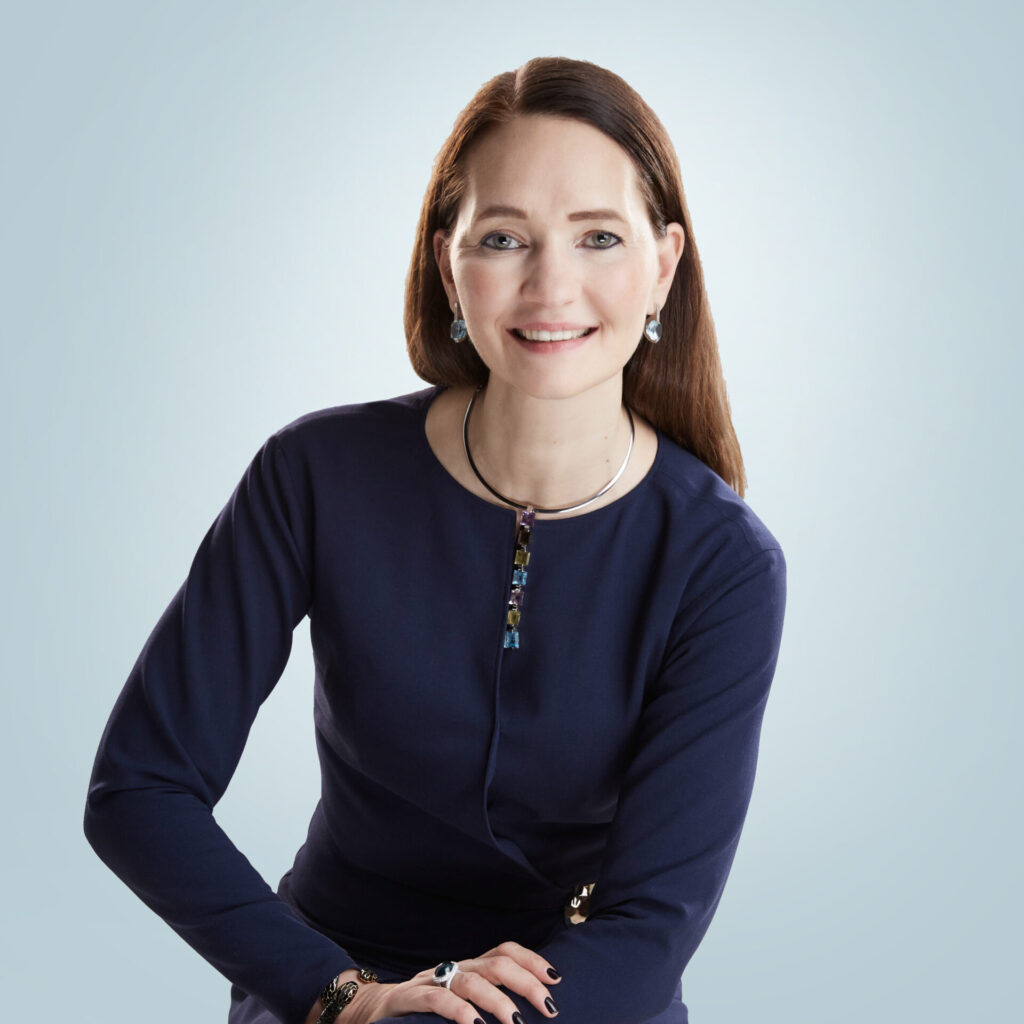
In line with the ambition to become one of the market leaders in Switzerland, Enna Pariset is appointed Chief Executive Officer of BNP Paribas (Suisse) SA*. She will assume this position from July 1st, in addition to her role as Head of Territory for BNP Paribas Group in Switzerland. Enna will also continue in her role as CEO of Corporate & Institutional Banking Switzerland.
She will further focus on growing the business and developing the franchise in Switzerland while keeping on supporting the transformation of the Swiss territory to allow continuous efficiency improvement.
Enna Pariset, with 29 years’ experience in banking, 19 of which at BNP Paribas, has served in senior client facing and management positions across the Corporate & Institutional Bank.
* Subject to approval from FINMA and the Board of Directors of BNP Paribas (Suisse) SA

“BNP Paribas has been present in Switzerland for over 150 years, having contributed to the early industrialization of the country by financing the Gotthard and Simplon railway infrastructures. Switzerland with its strong export-oriented economy is an important growth market for BNP Paribas.
As a leading European global bank present in 65 countries, our aim is to be a market leader and the trusted local international banking partner for Swiss clients.
Driven by our strong growth and planned further investments in the country, my team and I are committed to making an important contribution to the global success of Swiss businesses and the Swiss financial center at large”.
Enna Pariset
The Skilly award 2022 in the category “Team Project Competence Development” goes to our Swiss Learning & Development team.
Thanks to an unconventional approach, the L&D team anchored a culture of continuous development within the Bank in Switzerland. This award is the recognition of the strong partnership established between HRBPs, L&D and the Business Lines, and is therefore an award for BNP Paribas in Switzerland and its employees as a whole.
This distinction rewards banks that have been able to accompany their employees to acquire new skills in a constantly changing professional environment.
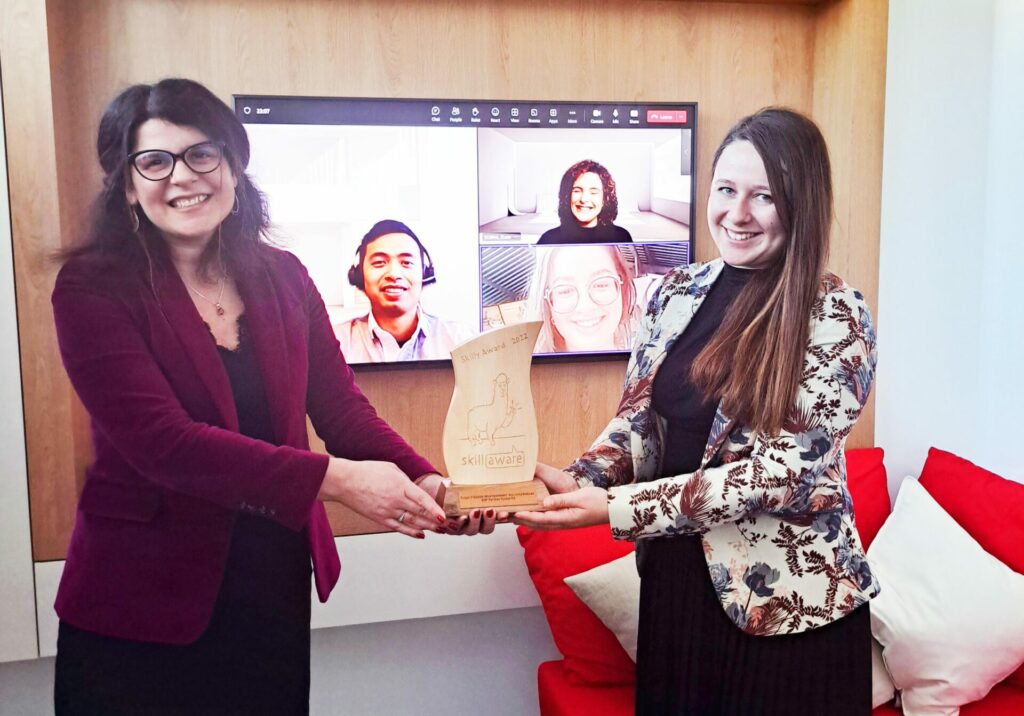
It is important for our L&D team to show that the once-classic pattern of obtaining a diploma and having a job in the same company all your life is now obsolete. We must regularly take the lead and reinvent ourselves, and it is our role to raise awareness among our employees and our Business Lines about this.
Marie-Angélique Rault, Head of L&D and Talent Manager
Find out more about our development culture in the interview (in French) of our Head of Learning & Development and Talent Manager, Marie-Angélique Rault.
BNP Paribas announces a new governance for Switzerland ahead of celebrating its 150 years in the country in 2022.

Enna Pariset, currently CEO of Corporate & Institutional Banking Switzerland, is appointed Head of Territory for
BNP Paribas in Switzerland, effective January 1st 2022.
Enna Pariset, with 28 years’ experience in banking, 18 of which at BNP Paribas, has served in senior client facing and management positions across the Corporate & Institutional Bank.
In her new role as Head of Territory, she will supervise and represent all BNP Paribas Group businesses in Switzerland and lead their strategic development plans and investments in the country.
In addition to her new remit, Enna Pariset will also continue to serve as CEO of Corporate & Institutional Banking
Switzerland.

Arnaud Zeitoun, currently Deputy CEO of BNP Paribas (Suisse) SA, is appointed CEO of BNP Paribas (Suisse) SA
effective January 1st 2022.
Arnaud Zeitoun joined BNP Paribas in 2003, serving in senior capacities within the Fixed Income and Global Markets teams.
He then served as Global Head of Transformation and member of the Executive Committee at BNP Paribas Asset Management from 2016 to 2019.
In his new role, Arnaud Zeitoun will lead the bank through its strategic transformation and support BNP Paribas Group’s projects in Switzerland.

After three and a half years leading the Group’s activities in Switzerland, Monique Vialatou has decided, in agreement with Group Management, to step down from her responsibilities as Head of Territory in Switzerland
and CEO of BNP Paribas (Suisse) SA from December 31st 2021.
Thanks to the work of Monique Vialatou these last years, BNP Paribas is now well positioned to continue its development in Switzerland